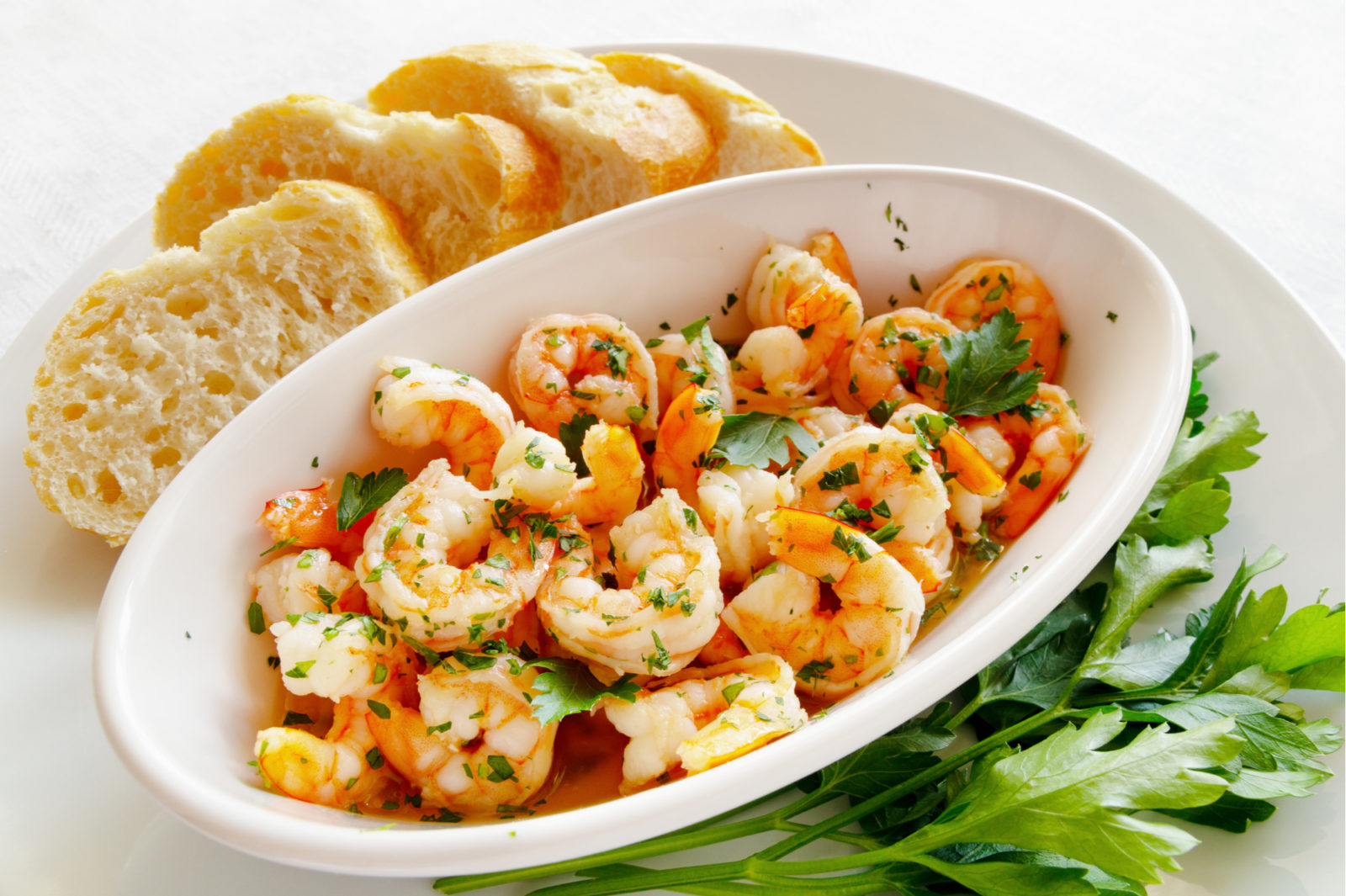Canada has a great assortment of prawns/shrimp which are both caught or farmed sustainably. You can use either Ocean Wise or the David Suzuki Foundation to make an informed choice on your Canadian shrimp/prawn selection! Speak to your local fishmonger, or if you are so lucky to live by the Pacific or Atlantic coast jump down to the harbor and visit the fishermen themselves.
Seafood Fraud
If you are not sure about where your shrimp (or other seafood) is coming from, it is best to leave it be and choose something thing that you feel confident purchasing. Farming practices in Canada can be very eco-friendly and sustainable. This may not apply to overseas farming practices. Many use drugs to feed their fish – some of these drugs may be outlawed and unapproved for use in Canada, moreover, they may negatively impact the surrounding environment by dumping waste. In 2014 the US State Department issued that slave labor attributed to human trafficking was being used in the harvesting of farmed shrimp in Thailand.
The United States receives most of its shrimp as an import, Canada also imports shrimp (therefore remember to make sure that the shrimp you buy is Canadian through and through), and it is sad to state that approximately less than 2% of this imported shrimp is tested, this means that there is potential for illegal chemicals and drug residue to be present in every imported bag. When the Canadian Food Inspection Agency tested shrimp from Thailand (much of which is just shrimp from China that has been relabelled) they found; tetracyclines (antibiotic used in the treatment of acne) nitrofurans (an antimicrobial drug – carcinogen) and fluoroquinolones (antibiotics used in a variety of human medicine). None of these things is something one would want to have in their dinner. Other countries that have transshipments of Chinese shrimp are Malaysia and Indonesia.
To ensure you get safe, good quality and healthy shrimp pick Canadian!! The Pacific coast of Canada has fisheries that catch prawn by a trap. Spot prawns are the biggest species of shrimp in the west coast. One can distinguish them by their reddish-brown shell and white spots on its back/abdomen. There are other Canadian prawns that are clean of unwanted additives, sustainable and eco-friendly, you can find a list of these at Ocean Wise or Sea Choice.
Shrimp – A Nutritionally Dense & Delicious Prawn
Shrimp are a phenomenal source of Selenium (with an 80-85% absorption rate), Vitamin B12 & B3, Phosphorus, chlorine, zinc, iodine, and copper. They are also a great source of protein. It is a rich source of astaxanthin, an antioxidant that has been shown to decrease the risk of colon cancer, as well as an aid to both the nervous system and the musculoskeletal system. It’s high selenium and copper count make it a great food source for supporting healthy lung function.
Recipe
Garlic Butter Shrimp is finger-licking good!! It will fill you up and keep you full without weighing you down and making you feel groggy. The Quinoa Pilaf is a fantastic edition that is super delicious, creamy and a delight for the pallet. I have to say, I am not the biggest fan of shrimp, I much rather squid, octopus or scallops but garlic butter shrimp is just….well it’s amazing!!
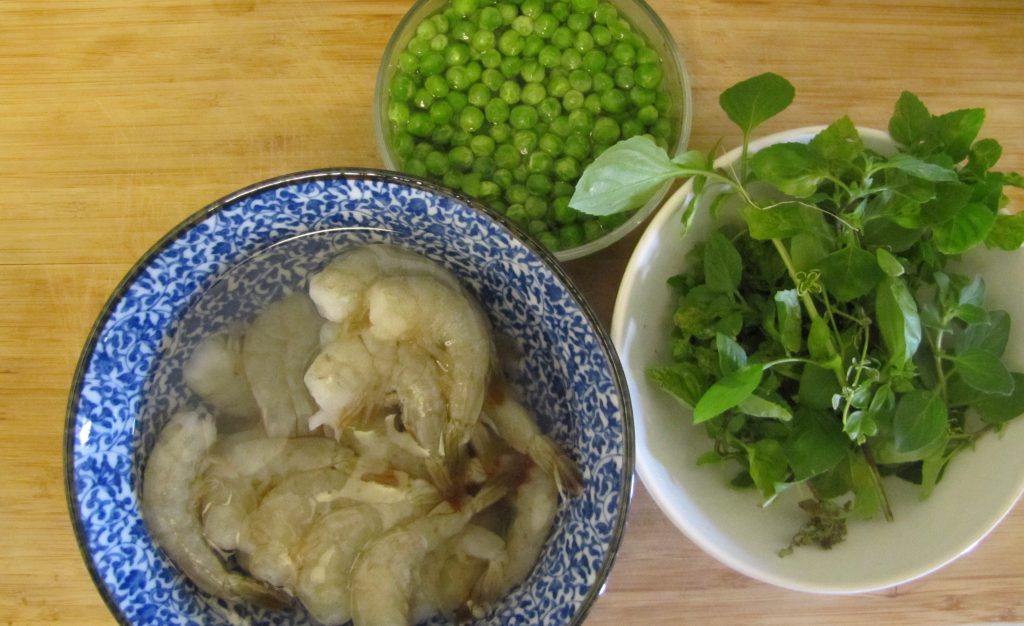
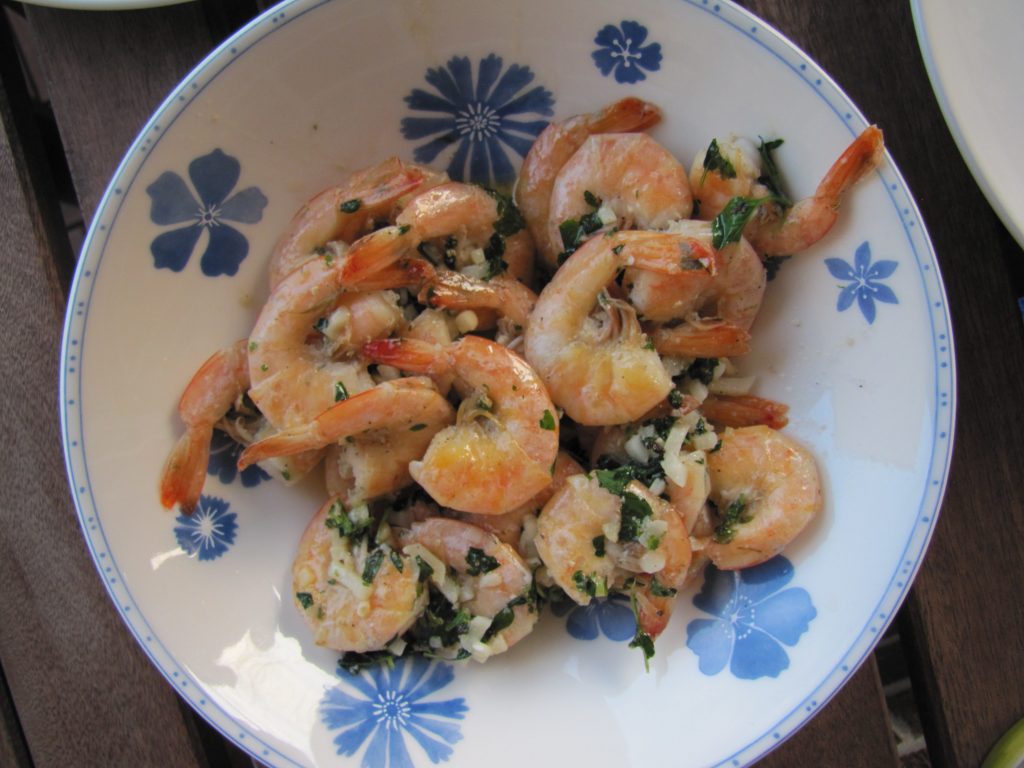
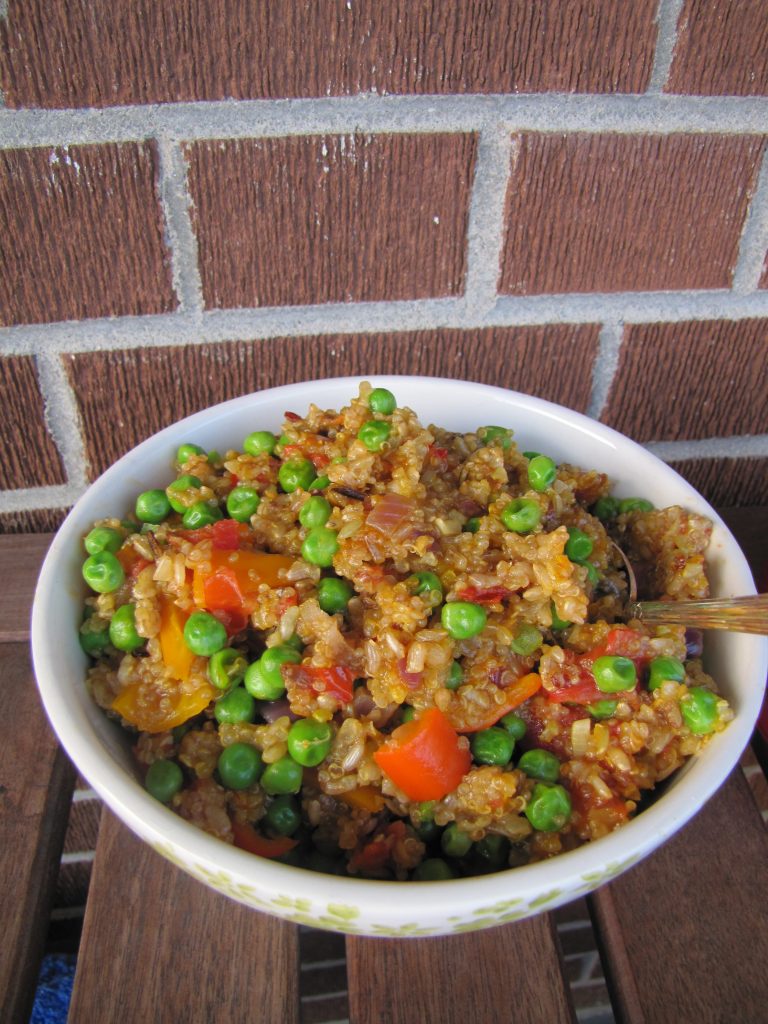
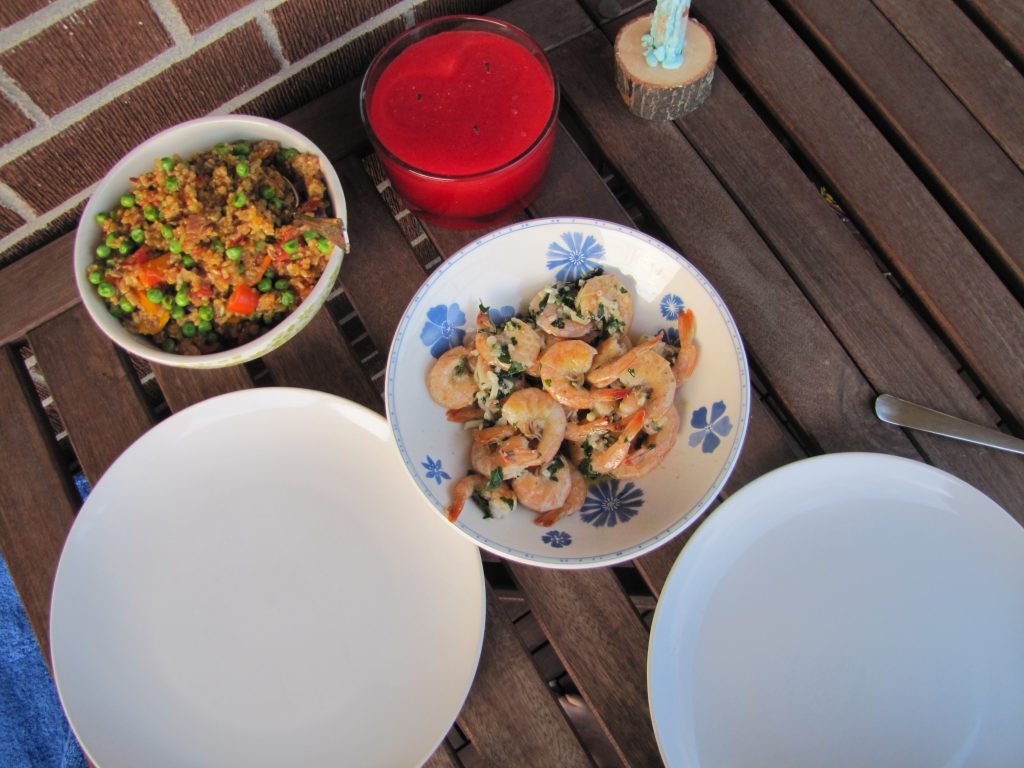
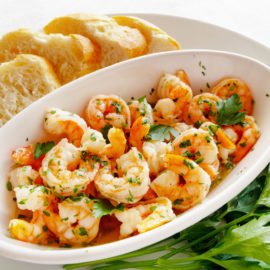
Garlic Butter Shrimp
Ingredients
- 15-20 Prawns
- 2-3 tbsp Butter Organic Grass Fed
- 1/2 cup chopped Fresh Herbs Basil, Thyme, Oregano, Parsley
- 3-4 garlic cloves minced and left to set for 10 min.
- Himalayan Salt to taste
- Pepper to taste
Instructions
- In a medium-sized pan add the butter and let it melt over medium to high heat.
- Once melted add in the shrimp and garlic (make sure that garlic has set for 10 min after mincing so as to activate the enzymes).
- Stirring occasionally to allow the shrimp to flip over. Once they have started to turn opaque add in the fresh herbs and salt and pepper.
- Cook until they are nice and firm and completely opaque. Serve with the hot and drizzle the garlic herby butter let in the pan over top.
Nutrition
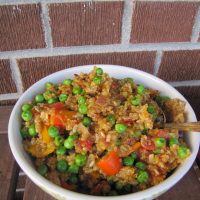
Sprouted Quinoa and Rice Pilaf
Ingredients
- 1-2 tbsp butter olive oil or coconut oil
- 1 cup of sprouted quinoa and rice mix
- 1 1/2 cups of homemade bone broth you may need less
- 1/2 red onion diced
- 1 red pepper chopped
- 1 1/2 -2 cups sliced vine-ripened and cherry tomatoes
- 1/2 cup snow peas
- 1-2 garlic cloves mined and set aside for 10 min
- 1/2 tsp saffron
- Himalayan salt to taste
- pepper to taste
- handful of fresh herbs minced basil, oregano, thyme
Instructions
- In a medium pan add butter or oil of choice and melt over medium to high heat. Once melted add in the onions, garlic and a sprinkling of salt and pepper and let it cook over medium heat until the onions have become translucent – stir occasionally.
- Once the onions have caramelized add in the sliced tomatoes and chopped pepper. Cover the saucepan, turn heat to medium-low and let the tomatoes and pepper break down.
- Once the tomatoes and pepper have broken down and have released a great deal of liquid add in the sprouted quinoa and rice mixture as well as the saffron. Let the quinoa and rice soak up the flavours for between 5-8 minutes, or until the juices have been soaked up. Stir occasionally, cover the pan.
- Add in the broth a little at a time, letting it soak into the rice and quinoa before adding in more. Taste the rice and quinoa mixture after 15 minutes of cooking to see how tender it is. As it is sprouted it should require approximately 15 minutes until it is tender enough to eat. Le the pan be uncovered.
- Before taking the pan off the heat add in the snow peas and herbs. Let me cook for a bit so that the flavours can incorporate.
- Take off the heat and plate to serve!
Nutrition
References
Government of Canada, Fisheries and Oceans Canada, Communications Branch. (2015, March 06). Shrimp.Available online from http://www.dfo-mpo.gc.ca/fm-gp/sustainable-durable/fisheries-peches/shrimp-crevette-eng.htm
OLMSTED, L. (2017).REAL FOOD/FAKE FOOD: why you don’t know what you’re eating and what you can do about it. S.l.: ALGONQUIN OF CHAPEL HILL.
Shrimp (n.d.). Available online from http://www.whfoods.com/genpage.php?tname=foodspice&dbid=107
Shrimp/Prawns Archives. (n.d.). Available online from http://seafood.ocean.org/seafood/type/shrimpprawns/
Society, N. G. (2012, October 09). Sustainable fishing. Available online from https://www.nationalgeographic.org/encyclopedia/sustainable-fishing/
Southern Shrimp Alliance. (n.d.). Available online from http://www.shrimpalliance.com/japanese-and-canadian-governments-vietnamese-farmed-seafood-imports-unsafe/
Spot Prawns. (n.d.). Available online from http://www.davidsuzuki.org/what-you-can-do/food-and-our-planet/spot-prawns/
Amanda Filipowicz is a certified nutritional practitioner (CNP) with a bachelor in environmental studies (BES) from York University. She also has certification in clinical detoxification, prenatal and postnatal care as well as nutrition for mental health. She has been working as a nutritionist since 2013 and is a lifelong proponent of eating healthy.

